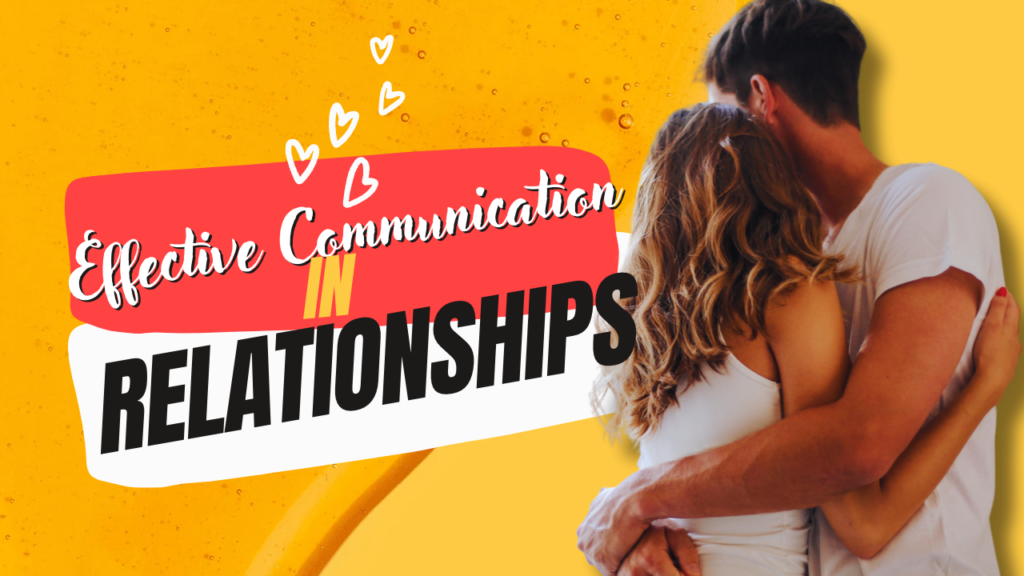Effective communication is the cornerstone of healthy and thriving relationships. Whether you’re dating, engaged, married, or in any form of a committed partnership, the ability to communicate openly and honestly is vital for understanding, resolving conflicts, and strengthening emotional bonds.
In this article, we will explore the importance of effective communication in relationships and provide practical strategies to enhance communication skills for building stronger connections.
Understanding the Importance of Effective Communication:
Effective communication is more than just exchanging words; it involves active listening, empathy, and understanding. When couples communicate effectively, they create an environment of trust, respect, and emotional safety. Here are some reasons why effective communication is crucial in relationships:
Establishing Emotional Intimacy: Effective communication allows partners to express their emotions, needs and desires openly. It fosters a sense of emotional intimacy, promoting a deeper understanding of each other’s inner world.
Conflict Resolution: Misunderstandings and conflicts are inevitable in any relationship. Effective communication helps partners navigate disagreements, find common ground, and work towards resolutions that honor both individuals’ needs and feelings.
Strengthening Connection: Clear and honest communication builds a strong foundation of trust and connection. It creates opportunities for couples to share their joys, fears, dreams, and vulnerabilities, fostering a sense of closeness and intimacy.
Strategies for Enhancing Communication in Relationships
Active Listening: Being present and fully engaged when your partner is speaking is crucial. Practice active listening by maintaining eye contact, nodding to show understanding, and refraining from interrupting. Give your undivided attention and validate your partner’s feelings.
Use “I” Statements: When expressing your thoughts or concerns, use “I” statements instead of “you” statements. For example, say, “I feel hurt when…” instead of “You always…” This approach reduces defensiveness and encourages a non-blaming conversation.
Practice Empathy: Put yourself in your partner’s shoes and try to understand their perspective. Empathy allows you to connect on a deeper level and respond with compassion and support.
Avoid Assumptions: Assumptions can lead to misunderstandings and unnecessary conflicts. Instead of assuming, ask for clarification and seek to understand your partner’s intentions or motivations before jumping to conclusions.
Validate Feelings: Validate your partner’s feelings, even if you may not fully agree or understand them. Letting them know their emotions are valid and important fosters an atmosphere of acceptance and support.
Be Mindful of Non-Verbal Cues: Communication involves more than just words. Pay attention to your body language, tone of voice, and facial expressions. Non-verbal cues can convey messages that either reinforce or contradict your spoken words.
Schedule Regular Check-Ins: Set aside dedicated time to connect and communicate with your partner regularly. This can be a weekly date night or a daily debriefing session where you discuss your day, thoughts, and feelings.
Practice Constructive Feedback: When providing feedback or expressing concerns, focus on the behavior or issue at hand rather than attacking your partner’s character. Be specific, objective, and offer suggestions for improvement.
Resolve Conflict Calmly: During conflicts, take breaks when emotions run high to avoid saying hurtful things in the heat of the moment. Return to the conversation when you both feel calmer and can communicate more effectively.
Seek Professional Help: If communication challenges persist or become overwhelming, seeking couples counseling can provide a supportive and neutral space to work through deeper issues and enhance communication skills.
Conclusion
Effective communication is the lifeblood of healthy and fulfilling relationships. By practicing active listening, empathy, and open dialogue, couples can build stronger connections, resolve conflicts and foster a deeper understanding of each other. Remember that effective communication requires ongoing effort and practice.
It is a skill that can be honed over time, leading to a more satisfying and harmonious relationship.
By implementing the strategies mentioned above, couples can begin to improve their communication and strengthen their bond. Active listening and empathy create an atmosphere of trust and openness, allowing partners to feel heard and understood.
Using “I” statements promotes ownership of emotions and prevents blame from creeping into conversations. Avoiding assumptions and seeking clarification can prevent misunderstandings and unnecessary conflicts.
Validation of feelings is essential in creating a safe space for open communication. Acknowledging and accepting each other’s emotions fosters empathy and emotional connection. Being mindful of non-verbal cues helps in understanding the full spectrum of communication, beyond just words.
Regular check-ins provide dedicated time to connect and communicate, ensuring that both partners are on the same page and addressing any concerns that arise.
Constructive feedback allows for growth and improvement within the relationship. By focusing on behaviors rather than attacking characters, couples can address issues effectively and work towards positive change.
When conflicts arise, taking breaks and returning to the conversation with a calm mindset ensures a more productive discussion.
In some cases, despite efforts to improve communication, couples may face persistent challenges. Seeking professional help from marriage counseling experts can be a valuable step toward resolving deeper issues and gaining professional guidance.
Trained therapists can provide tools, techniques, and insights tailored to the specific dynamics of the relationship.
In conclusion
Effective communication is the foundation of a healthy and thriving relationship. By actively implementing strategies such as active listening, empathy, validation, and constructive feedback, couples can enhance their connection and resolve conflicts more effectively.
Remember that effective communication requires ongoing effort, patience, and a commitment to understanding and supporting each other. With practice and dedication, couples can create a communication style that fosters love, trust, and intimacy, leading to a happier and more fulfilling relationship.

